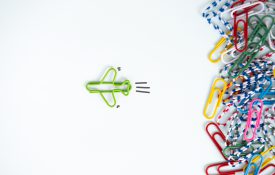-
Who Gets Power — And Why It Can Corrupt Even The Best Of Us
If you've ever visited the palm-lined neighborhoods of Beverly Hills, you've probably noticed that the rich and famous aren't the only ones drawn there. Stargazers also flock to this exclusive enclave, seeking a chance to peer into — and fantasize about — the lives of movie stars and film directors. Call it adulation, adoration, idolization: we humans are fascinated by glamour and power. But this turns out to be only one side of our psychology. We also feel envious — even resentful of the rich and powerful — and that ambivalence is deeply rooted in our evolutionary history.
-
The Despondent Mind: Are Our Brains Wired for Doom and Gloom?
If it seems the state of the world is on an endless downward trajectory these days, take heart. Things might not be quite as bad as you think. New research, published on June 29 in Science, suggests that as social problems such as extreme poverty or violence become less prevalent, people may be prone to perceive that they linger—and are perhaps even getting worse. Led by psychologist Daniel Gilbert at Harvard University, the researchers found people readily and unconsciously change how they define certain concepts—ranging from specific colors to unethical behavior—based on how frequently they run into them. “On almost every dimension, the world is getting better.
-
Can Crows Make Mental Pictures of Tools?
New Caledonian crows are known for their toolmaking, but Alex Taylor and his colleagues wanted to understand just how advanced they could be. Crows from New Caledonia, an island in the South Pacific, can break off pieces of a branch to form a hook, using it to pull a grub out of a log, for instance. Once, in captivity, when a New Caledonian male crow had taken all the available hooks, its mate Betty took a straight piece of wire and bent it to make one. “They are head and shoulders above almost every other avian subjects” at toolmaking, said Irene Pepperberg, an avian cognition expert and research associate in Harvard University’s department of psychology. “These crows are just amazing.”
-

Can Scientific Rigor and Creativity Coexist?
Will heightened standards for rigor and transparency quash the kind of inventive theories and predictions that have driven psychological science in the first place?
-
Mr. Rogers Had a Simple Set of Rules for Talking to Children
For the millions of adults who grew up watching him on public television, Fred Rogers represents the most important human values: respect, compassion, kindness, integrity, humility. On Mister Rogers’ Neighborhood, the show that he created 50 years ago and starred in, he was the epitome of simple, natural ease. But as I write in my forthcoming book, The Good Neighbor: The Life and Work of Fred Rogers, Rogers’s placidity belied the intense care he took in shaping each episode of his program.
-

Americans Exaggerate Their Home State’s Role in Building the Nation
Research on “collective narcissism” suggests many Americans have outsize notions about how much their home states helped to write the nation’s narrative.

